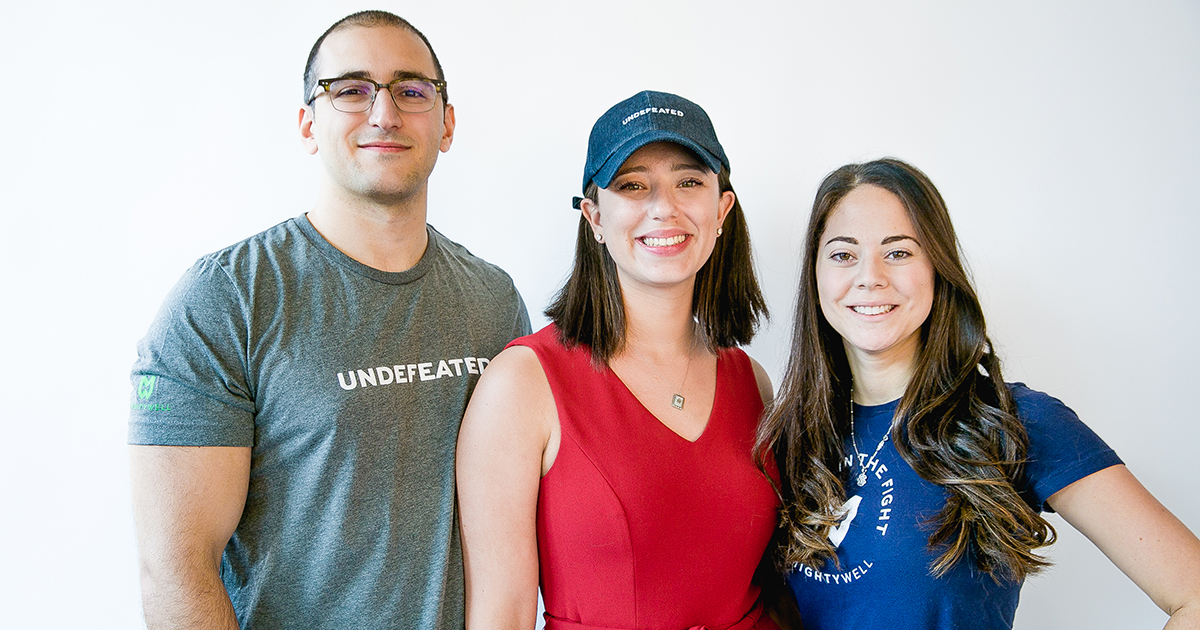When Making Masks Proves Purposeful and Personal

Nothing symbolized the year 2020 quite like the face mask. It became a ubiquitous, often required, item for people around the world to wear in response to the pandemic, to keep themselves and those around them safe.
The need for masks was so urgent that many companies quickly pivoted to begin producing masks at large quantities. It was an entrepreneurial, and even heroic, response to the immediate demands of hospitals, communities, and consumers.
Like many companies, Mighty Well—a medical accessory company built at Babson—also began producing face masks in 2020. But, unlike most companies, it wasn’t a change of direction, it wasn’t in response to the pandemic, and it was highly personal—for its customers and for its founders. And, it already was part of the plan.
“This wasn’t really a pivot for Mighty Well,” said Yousef Al-Humaidhi ’15, co-founder and CFO. “We’ve always prioritized the needs of our patients and the needs of our community members. The difference is that as the pandemic came in, those needs shifted drastically. … So, we didn’t completely throw out the old business model and replace it with a new one. We just moved with our market considering what was going on with COVID.”
Understanding Customer Needs
Mighty Well’s founding has been well documented. As a Babson sophomore, co-founder Emily Levy ’16 was diagnosed with chronic neurological Lyme disease. Working with Maria Del Mar Gomez ’16, and Al-Humaidhi (now her husband), Levy created a fashionable and functionable PICC line protector, which led to the formation of Mighty Well and a line of wellness accessories.
“We’ve always designed products that were specifically made for chronically ill patients,” Gomez said.
For Mighty Well’s immunocompromised customers, wearing masks was not a new concept. Even before the pandemic, its customers were clamoring for high-quality face masks, so Mighty Well began development in 2019. The pandemic only accelerated the need and the production, resulting in the launch of the Mighty Well Mask in June.
“It definitely helped that Mighty Well was founded by a chronically ill patient, because we understood what our consumers were going through,” Gomez said. “Our target market is my best friend and, for Yousef, his wife.”
Because of the pandemic, Mighty Well’s mask also helped increase its brand awareness and open new markets, including caregivers and those who have immunocompromised family and friends. The company’s community has more than doubled, from 20,000 community members to more than 50,000.
“It allowed us to reach another huge, different audience,” she said. “This has allowed us to grow the reach and the bulk of Mighty Well through this face mask.”
Adaptability and Responsibility
Like any entrepreneurial endeavor, especially a startup company, the ability to adapt to changing conditions is critical. Mighty Well is no different, although its approach might be.
“Considering Emily has had chronic Lyme disease since the inception of the company, we have a built-in flexibility and agility in our team,” Gomez said, “because we know that with a chronically ill founder, we need to be able to adapt quickly if something happens.”
With the pandemic and the growth of the company, Gomez and Al-Humaidhi have taken on greater responsibility and expanded roles. Plus, the company has been able to add three new part-time employees.
Al-Humaidhi notes that a purposeful level of redundancy has existed since the company’s earliest days.
“If someone critical to the business were to walk away, the business has the people in place, built in, to continue operation as though nothing happened,” he said. “We’ve really been intentional about making sure that we have that flexibility, not just as a startup, but considering that we work with several chronically ill and immunocompromised people in our team, we work with people that might have a bad day, and we have to be able to work around it because the business can’t stop.”
“Babson always taught us to think on the fly and react to things as they came. … A huge part of (Entrepreneurial Thought & Action) is you really need to put something out in the market first to get feedback right away and then iterate, iterate, and make changes as you need.”
Maria Del Mar Gomez ’16, Mighty Well co-founder
Staying Power
Mighty Well has proven in the past year that nothing can stop it. In addition to expanding its product line and its markets, Mighty Well is working on starting a clinical trial in 2021 and launching a new catheter securement device with medical distributors and hospitals.
“Babson always taught us to think on the fly and react to things as they came,” Gomez said. “The biggest thing that Emily was pushing for at the beginning of the pandemic was Entrepreneurial Thought & Action®. A huge part of it is you really need to put something out in the market first to get feedback right away and then iterate, iterate, and make changes as you need.”
And, the mask—that symbol of 2020—is here to stay, for Mighty Well and for its customers.
“As the caregiver of someone who is chronically ill, I know that I will wear a mask for the foreseeable future in settings like on planes and on buses, so I don’t see that really disappearing from the needs of our consumers,” Al-Humaidhi said, “and I think it’ll always be a core product line for us.”
Posted in Entrepreneurial Leadership




